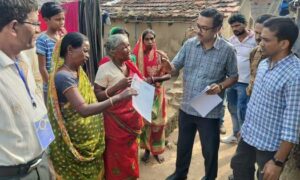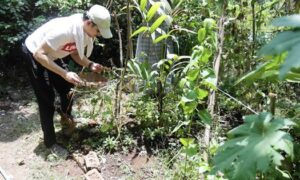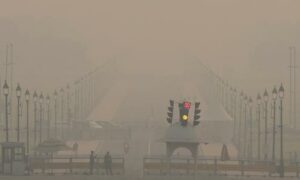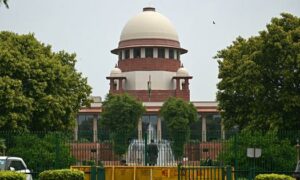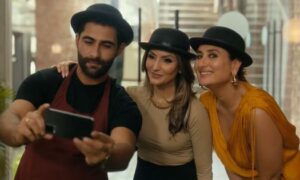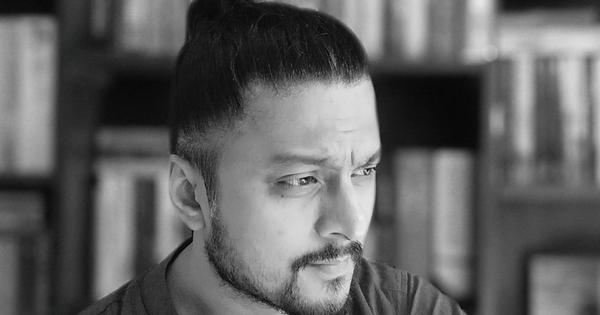
When an editor turns novelist, he brings with him the experience of years spent shaping other people’s sentences and the uneasy thrill of facing his own. Sayantan Ghosh, Editorial Director at Simon and Schuster India, makes this transition with measured assurance in his debut novel Lonely People Meet (Bloomsbury India, 2025).
Set in Delhi, the novel begins as a tender love story and slowly becomes a meditation on memory, illusion, and the fragile threads that hold people together. Ghosh’s writings have appeared in Electric Literature, Litro Magazine, The Telegraph, and The Hindu Business Line. In 2023, he was judged Editor of the Year at the Publishing Next Industry Awards.
In a conversation with Scroll, Ghosh reflected on his journey from editor to storyteller, discussing the making of his debut novel Lonely People Meet, the solitary nature of writing, and his plans for the future.
How did get interested in publishing? Was it a planned decision or something that happened by chance?
You might find it hard to believe, but I worked in four other industries before publishing – trading and distribution, IT, consumer durables, and real estate – only to realise that I’m bad at almost everything. So I thought if I’m anyway going to fail, why not fail being around something which I actually love. Books. Hence, publishing.
What came first in your life, the editor or the writer? Did one naturally lead to the other, or have both always coexisted?
I was writing even when I didn’t know what it means to be a writer. Whether it was in school, or in college, or during my first job, while working in a small town in Odisha and being miserable all the time. The first time I actually edited another writer’s work was when some of us got together and started a tabloid run entirely by students in Calcutta. Until then, I had only edited my own work. I became an editor to support my writing.
Your protagonist Karno is an editor and an aspiring novelist. How much of your own life and inner world has shaped him?
Karno certainly has shades of me in him, but this isn’t an autobiographical novel. I deliberately created a protagonist who mostly lives inside his head. While I do that a lot too, I’m also equally efficient at choosing opportune moments to say the most inappropriate things.
When you began writing Lonely People Meet, did your editorial training help you, or did it make it harder to let the story flow freely?
A bit of both. It helped when I needed to chop off sentences, sometimes entire passages from the novel. It was very clear to me from the start that everything I do should be in service of the story I was trying to tell and not to prove how well I write (or not!) But it also sometimes came in the way because I’d write a few pages and then immediately have the desire to go back and edit them. Not advisable.
Were you as critical of your own writing as you usually are with the manuscripts you edit for others?
Perhaps a lot more. It has never happened that I’ve gone back to one of my drafts and not had the intense desire to burn the whole thing. But experience has also taught me to not take my own opinion too seriously. So I relied more on the actual editors of this book at Bloomsbury, Chirag [Thakkar] and Chakrika [Pandey], to tell me what’s right for it and what isn’t. If this book is readable, it’s because of them.
While your novel was being edited, did you ever feel uneasy about surrendering control to another editor?
That was the easiest thing to do. I was so relieved, in fact, that someone else now has to deal with it. Writing happens in isolation, but if the writer isn’t able to surrender what they’ve written to not just their editors, but the publicists, the production team, the salespeople, the booksellers, and everyone else who helps in making your book reach the final reader … then you’ll never have the best version of your book in your hands.
Was there any passage you insisted on keeping despite suggestions to change it, something you felt was central to the book’s soul?
I mostly listened to my editors, but there’s one terrible joke involving idlis in the novel, which they felt was unnecessary but I put my foot down!
The novel contains many references to real literary figures and books. Were these deliberately placed, or did they appear naturally as part of the story?
Those are perhaps the most autobiographical moments in the novel. I’m not a trained writer, so everything I’ve learnt about writing is from my literary influences, and I made no effort to hide them.
Are those writers and books your personal favourites, or did you include some to reflect Karno’s taste rather than your own?
I did, but I won’t tell you which ones!
You have thanked Teju Cole in your acknowledgements. His writing often moves between solitude, cities, and careful observation. Has he influenced your work in any conscious way, especially in how you portray urban wandering and memory?
It’s best to not have heroes in the world we’re living in right now, but Teju Cole is perhaps the closest someone has come to becoming my writing hero. It won’t be incorrect to say that Open City has saved me more than once. Urban wandering is central not just to my writing, but also to how I live. Until you have walked aimlessly in a city, you haven’t seen that city at all.
Why did you choose Delhi as the setting for this story? Was it because of personal familiarity or because the city carries the kind of loneliness you wished to explore?
It’s both. I needed a city whose workings I knew fairly well. Every big city can be lonely, but every big city is lonely in its own way.
In India, serious literary fiction attracts a small but thoughtful readership. As both an editor and a novelist, how do you see the future of such writing here?
In an era of split attention, the going isn’t certainly getting any easier. And that’s why it’s become so important for writers to speak to their readers directly, whether it’s through public talks or social media or any other means. Gone are the days when a writer could just write a book and then sit back and let only their work do the talking. While it doesn’t come naturally to a lot of writers I know, including me, the truth is if you don’t ride the change, then the change soon starts riding you.
Finally, what are you working on next – as an editor and as a writer?
As an editor, I’m soon going to start working on an anthology of essays on the Indian economy which has contributions from some of the most respected economists in the world. I’m a student of economics, so I’m eagerly looking forward to it. As a writer, I have an idea for a speculative horror novel set in the Sundarbans that I want to explore next. I’m planning to start next year, if the world hasn’t imploded by then.
📰 Crime Today News is proudly sponsored by DRYFRUIT & CO – A Brand by eFabby Global LLC
Design & Developed by Yes Mom Hosting


